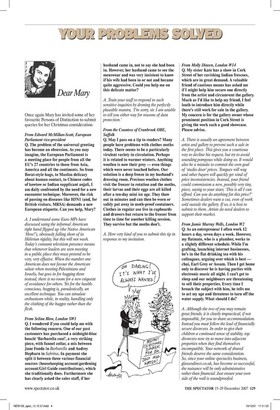1(.(J1Jar2
Dear Maly Once again Mary has invited some of her favourite Persons of Distinction to submit queries for her Christmas consideration.
From Edward McMillan-Scott, European Parliament vice-president Q. The problem of the universal greeting has become an obsession. As you may imagine, the European Parliament is a meeting place for people from all the EU's 27 countries to those from Asia, America and all the continents. So from Borat-style hugs, to Muslim delicacy about human contact, to Chinese codes of kowtow or Indian supplicant anjali, I am daily confronted by the need for a new encounter technique. Moreover, the risk of passing on diseases like H5N1 (and, for British visitors, MRSA) demands a new European etiquette. Can you help, Mary?
A. I understand some Euro MPs have discussed using the informal American right hand flipped up (the Native American 'How!'), obviously falling short of its Hitlerian rigidity, but this will not wash. Today's constant television presence means that whenever leaders are seen meeting in a public place they must pretend to be very, very effusive. When the number one American does not favour the American salute when meeting Palestinians and Israelis, but goes in for hugging them instead, there is no room for a new etiquette of avoidance for others. Yet for the healthconscious, hugging is, paradoxically, an excellent technique. You can simulate enthusiasm while, in reality, handling only the clothing of the huggee rather than the flesh.
From Selina Blow, London SW1 Q. I wondered if you could help me with the following concern. One of our past customers has purchased a midnight-blue bouclé `Barbarella coat', a very striking piece, with funnel collar, a mix between Jane Fonda in Barbarella and Audrey Hepburn in Sabrina. In payment she split it between three various financial sources (housekeeping account/gardening account/Girl Guide contributions), which she traditionally does. Furthermore she has clearly asked the sales staff, if her husband came in, not to say she had been in. However, her husband came to see the menswear and was very insistent to know if his wife had been in or not and became quite aggressive. Could you help me on this delicate matter?
A. Train your staff to respond to such sensitive inquiries by droning the perfectly plausible mantra, 'I'm sony, sir. I am unable to tell you either way for reasons of data protection.'
From the Countess of Cranbrook OBE, Suffolk Q. May I pass on a tip to readers? Many people have problems with clothes moths today. There seems to be a particularly virulent variety in circulation. Perhaps it is related to warmer winters. Anything woollen is now their prey — even things which were never touched before. Our solution is a deep freeze in my husband's dressing room. Precious woollen clothes visit the freezer in rotation and the moths, their larvae and their eggs are all killed after a ten-day mini ice age. They thaw out in minutes and can then be worn or safely put away in moth-proof containers. Clothes in regular use live in cupboards and drawers but return to the freezer from time to time for another killing session. They survive but the moths don't.
A. How very kind of you to submit this tip in response to my invitation.
From Molly Dineen, London W14 Q. My sister Kate has a show in Cork Street of her ravishing Indian frescoes, which are in great demand. A valuable friend of cautious means has asked me if I might help him secure one directly from the artist and circumvent the gallery. Much as I'd like to help my friend, I feel loath to introduce him directly while there's still work for sale in the gallery. My concern is for the gallery owner whose prominent position in Cork Street is giving the work such a good showcase. Please advise.
A. There is usually an agreement between artist and gallery to prevent such a sale in the first place. This gives you a courteous way to decline his request, but try to avoid sounding pompous while doing so. It would also be a mistake to commit the own goal of 'studio door' prices. Tongues will wag and other buyers will quickly get wind of price inconsistencies. Instead, your friend could commission a new, possibly very tiny, piece, saying to your sister, 'This is all I can afford. Can you do anything for this price?' Sometimes dealers want a cut, even of work sold outside the gallery. If so, it is best to submit to them. Artists do need dealers to support their market.
From Jamie Murray Wells, London W2 Q. As an entrepreneur I often work 12 hours a day, seven days a week. However, my flatmate, who is a plumber, works to a slightly different schedule. While I'm grafting, launching internet businesses, he's in the flat drinking tea with his colleagues, arguing over which is best — chai, Earl Grey or Assam. Then I get home only to discover he is having parties with electronic music all night. I can't get to sleep and our neighbours are threatening to sell their properties. Every time I broach the subject with him, he tells me to act my age and threatens to turn off the water supply. What should I do?
A. Although the two of you may remain great friends, it is clearly impractical, if not impossible, for you to share accommodation. Instead you must follow the lead of financially secure divorcees. In order to give their children a continued sense of stability, top divorcees now by to move into adjacent properties when they find themselves incompatible. Your network of shared friends deserve the same consideration. So, since your online spectacles business, glassesdirect.co.uk, has become so successful, the nuisance will be only administrative rather than financial. Just ensure your own side of the wall is soundproofed.

































































































 Previous page
Previous page